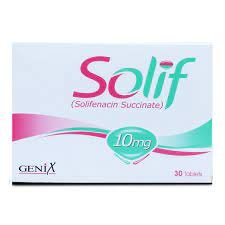Solif 10mg Tablet contains the active ingredient Solifenacin Succinate, which belongs to a class of medications known as antimuscarinic agents. It is primarily used to treat overactive bladder (OAB) symptoms such as urinary frequency, urgency, and urge incontinence. Solifenacin works by relaxing the bladder muscles, thereby reducing urinary urgency and frequency.
Uses:
Solif 10mg Tablet is prescribed for the following purposes:
- Overactive Bladder (OAB): It is used to treat symptoms of overactive bladder, including urinary urgency, frequency, and urge incontinence.
- Urinary Incontinence: Solif 10mg Tablet may also be used to manage urinary incontinence associated with OAB.
Side Effects:
While Solif 10mg Tablet is generally well-tolerated, some individuals may experience side effects, including:
- Dry Mouth: Solifenacin can cause dryness of the mouth, which may be relieved by drinking water or using sugar-free gum or candy.
- Constipation: Some patients may experience constipation while taking Solif 10mg Tablet. Increasing fluid intake and dietary fiber may help alleviate this side effect.
- Blurred Vision: Blurred vision may occur as a side effect of Solifenacin. It is important to exercise caution while driving or operating machinery if experiencing this side effect.
- Urinary Retention: In rare cases, Solifenacin may cause urinary retention, which requires immediate medical attention.
Precautions:
Before using Solif 10mg Tablet, it is important to consider the following precautions:
- Medical History: Inform your doctor about any pre-existing medical conditions, especially narrow-angle glaucoma, urinary retention, liver or kidney problems.
- Medication Interactions: Solifenacin may interact with certain medications, including other anticholinergic drugs and medications that affect liver enzymes, so inform your doctor about all the medications you are taking.
- Pregnancy and Breastfeeding: The safety of Solif 10mg Tablet during pregnancy and breastfeeding has not been established. Consult your doctor before using this medication if you are pregnant, planning to become pregnant, or breastfeeding.
- Elderly Patients: Elderly patients may be more susceptible to the side effects of Solif 10mg Tablet, particularly dizziness and constipation.
When Not to Use:
Solif 10mg Tablet should not be used in the following situations:
- Allergy: If you are allergic to Solifenacin or any other components of the medication, avoid using Solif 10mg Tablet.
- Urinary Retention: Solif 10mg Tablet is contraindicated in patients with urinary retention, as it may worsen this condition.
FAQ:
- How long does it take for Solif 10mg Tablet to work? The onset of action of Solif 10mg Tablet may vary among individuals, but noticeable improvements in OAB symptoms are typically observed within a few weeks of starting treatment.
- Can Solif 10mg Tablet be taken with food? Solif 10mg Tablet can be taken with or without food. However, taking it with a meal may help reduce the risk of gastrointestinal side effects such as upset stomach.
- What should I do if I miss a dose of Solif 10mg Tablet? If you miss a dose, take it as soon as you remember, unless it’s almost time for your next dose. In that case, skip the missed dose and continue with your regular dosing schedule. Do not double the dose to catch up.
- Can Solif 10mg Tablet be used in children? The safety and efficacy of Solif 10mg Tablet have not been established in children. This medication is typically intended for use in adults only.
- Is it safe to drink alcohol while taking Solif 10mg Tablet? Alcohol consumption should be moderated or avoided while taking Solif 10mg Tablet, as it may increase the risk of certain side effects such as dizziness and drowsiness.






Reviews
There are no reviews yet.